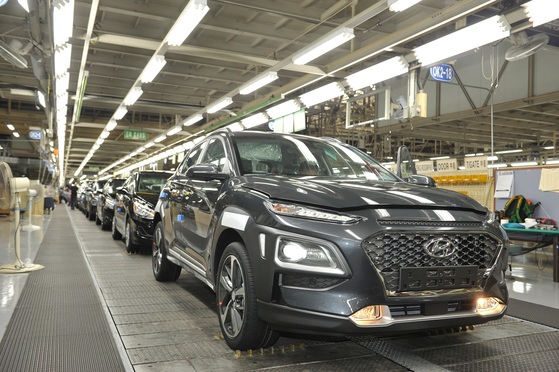
Hyundai Motor Company’s Ulsan Plant 1 Kona production line. Photo hyundai car
On the 10th, the labor and management of Hyundai Motors agreed on the number of production people (Man Hour) to be put into the Ionic 5 mass-produced at Ulsan Plant 1 from the end of March. However, compared to internal combustion locomotives, electric vehicles have fewer parts and fewer production manpower. However, it is pointed out that the labor and management of Hyundai Motors will have a problem in productivity as the existing manpower is almost unchanged.
Hyundai Motor’s labor-management agreement to transfer 100 people
The discussion of the personnel for the Ionic 5 assembly line between Hyundai Motor Company’s labor and management began last year. However, electric vehicles have significantly reduced production manpower compared to conventional vehicles, and labor and management have been struggling with reduction of input manpower and conversion arrangements. In this agreement, the two sides are known to have decided to entrust 100 of the approximately 3,500 people who worked at Ulsan Plant 1 to work other than the assembly line or switch to a plant other than the 1st plant.
However, the automobile industry analyzes that the agreement between Hyundai Motor Company’s labor and management is virtually the same as leaving the existing personnel intact when considering the electric vehicle process. Moreover, Hyundai Motor’s labor and management reduced the unit per hour (UPH) of Ulsan Plant 1 this time by 3%. Last year, the first factory that produced a mixture of Kona internal combustion engines, hybrids, and electric vehicles (BEVs) produced 95 vehicles in an hour. However, this year, the company decided to change the facility to Ioniq 5 and Kona internal combustion engine and hybrid and produce 92 units. Of these, the IONIQ 5 line produces 27 units per hour and about 9000 units per month. From the end of March to the end of the year, it plans to produce 72,000 units, which is the target of this year for nine months.
30% less electric vehicle parts, less work
The automotive industry points out that there is a great concern that the productivity of the IONIQ 5 will decrease and the price as well as the competitiveness of Korea’s electric vehicles will be lowered accordingly. First of all, the number of parts (UPG, Uniform Part Group) in the IONIQ 5 electric vehicle is 360, which is 72% of the internal combustion engine vehicles (about 500). The number of parts to be assembled on the assembly line is reduced by almost 30%. 180 units such as engine, transmission, fuel, and intake systems, which are UPGs for internal combustion engines, will be removed, and 35 to 40 electric vehicle UPGs such as motors, reducers, and electric fields will be newly added. UPG is a unit of parts for finished vehicles classified by Hyundai Motor Company in consideration of the structure and function of the vehicle.
Despite the reduction in the assembly process, the reason for the slight adjustment of personnel seems to have been reflected in the union’s insistence on reducing jobs. In fact, the labor and management have been creating friction over the number of personnel used in the electric vehicle assembly line. In January, some members of the Ulsan plant responded to concerns about the reduction of workforce, and once set up a production line for the Ioniq 5 test vehicle. Hyundai Motor’s labor and management have decided to reduce the number of employees by about 20% through the Employment Stability Committee by not conducting new recruitment to replace retired retirees in preparation for the reduction in workforce caused by the transition to electric vehicles.
Job reduction needs to come up with social alternatives
“Because the process itself is simplified, manpower reduction is a natural step,” said Lee Ho-geun, a professor at Daedeok University’s automobile department.
Mobility expert Cha Doo-won said, “It is the point where we are concerned that the reduction due to electric vehicle conversion is greater than the natural reduction of manpower.”
However, it is a view that social consensus and countermeasures are needed to reduce employment. “It is necessary to put in the right manpower for the production process of electric vehicles, but it is a social blow in that high-quality jobs are saved,” said Cho Cheol, a researcher at the Korea Institute of Industry. It’s time to do it.”
Reporter Kim Young-joo [email protected]
![]()
